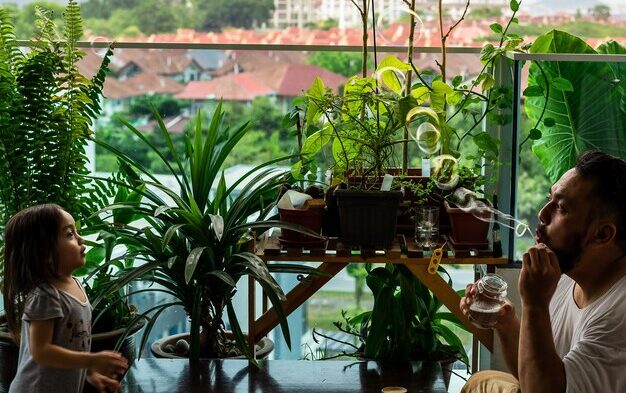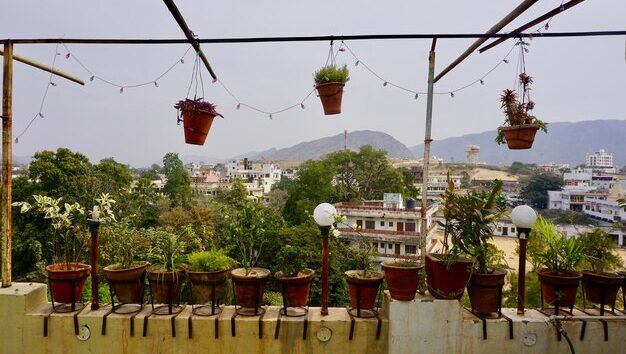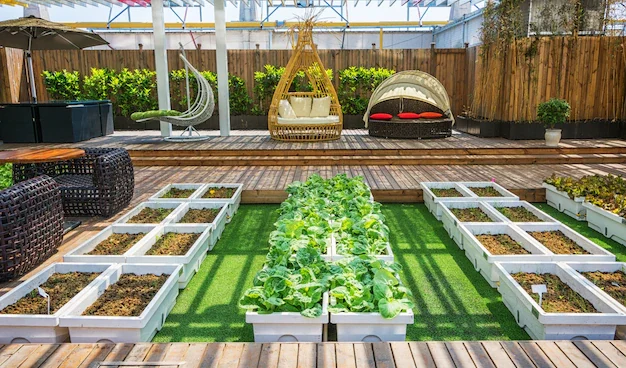Table of Contents
ToggleHow to do Organic Farming on Terrace
Introduction:
Organic farming on terraces can be an innovative and sustainable way to grow your own food by maximizing limited space. As urban areas expand, many people are turning to terrace gardening for fresh, pesticide-free produce. Terrace farming not only promotes self-sufficiency but also contributes to a healthy environment. In this blog post, we’ll walk you through the steps necessary to start your organic terrace garden, share helpful tips, and answer frequently asked questions to ensure your farming journey is a success.

Why organic farming on terraces?
1. Organic farming on terraces offers many benefits. This allows you to:
• Can grow your own vegetables and herbs in limited space.
• Eliminates the need for harmful chemical pesticides and fertilizers.
• Growing fresh produce at home can save money on grocery bills.
• Reduces your carbon footprint by reducing your dependence on store-bought food.
• Create a peaceful, green oasis in the middle of your home.
2. Key Factors for Organic Farming on Terraces
Choosing the right plants: Not all plants are suitable for terrace farming. Choose plants that grow in containers and require the least amount of space. Some popular organic plants for terraces include tomatoes, spinach, mint, basil, lettuce, and radishes. These plants can easily be grown in small pots or selected beds.
Soil Preparation: Healthy soil is the foundation of successful organic farming. Use a well-drained, nutrient-rich soil mix that contains compost and organic matter. You can make your own compost at home or buy organic compost from a garden store. Avoid using chemical fertilizers or soil treatments.
Container Gardening: Terrace farming usually relies on container gardening. You can use pots, buckets, crates, or even vertical planters to grow your crops. Make sure the container has drainage holes to prevent waterlogging and root rot.
Sunlight and Watering: Most plants need at least 6 hours of sunlight per day to thrive. Choose a spot on your terrace that gets plenty of sunlight. Additionally, water your plants regularly, but make sure not to overwater them. Organic farming avoids chemical pesticides, so it is important to control pests naturally using methods such as neem oil, garlic spray or companion planting.
3. Sustainable farming practices for your terrace garden
Companion planting: Companion planting is an organic technique where specific plants are grown together because they benefit each other. For example, basil can be planted next to tomatoes to keep pests like aphids at bay. This method promotes healthy plant growth without the need for chemicals.
Mulching: Covering the soil with organic mulch (such as straw, grass clippings, or leaves) helps retain moisture, suppress weeds, and maintain temperature stability. Mulching is an effective technique for organic terrace gardening.
Crop rotation: To prevent soil erosion and reduce the risk of pests, rotate your crops each season. For example, if you grow tomatoes one season, plant leafy greens the next. This method helps in maintaining soil fertility and reduces the population of pests and diseases.

Frequently Asked Questions: Organic Farming on Terraces
Many vegetables thrive on terraces, but not all are suitable. Plants such as tomatoes, chilies, cucumbers, lettuce basil, and mint are ideal for terrace farming. Avoid large plants like corn or pumpkins, as they require more space
Most plants need at least 6 hours of sunlight per day. Choose a sunny spot for your garden to ensure plants get enough light for healthy growth.
Natural pest control methods include using neem oil, and garlic sprays to attract beneficial insects such as ladybugs. You can also practice companion planting to keep pests at bay.
At first, the cost of containers, soil, and planting may seem high. However, in the long run, organic terrace farming saves money by reducing grocery bills, especially if you grow a variety of vegetables and herbs.

Conclusion: Enjoy the Benefits of Organic Farming on Your Terrace
Organic farming on a terrace is a rewarding and sustainable way to grow fresh food while making the most of your available space. Whether you have a small apartment or a larger rooftop, organic farming can be adapted to fit your needs. By following the tips and techniques outlined in this guide, you’ll be on your way to creating a thriving organic garden. Not only will you enjoy the fruits of your labor, but you’ll also contribute to a healthier planet by practicing eco-friendly farming. Happy gardening!
